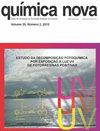工业植物性饮料的物理化学方面
IF 0.7
4区 化学
Q4 CHEMISTRY, MULTIDISCIPLINARY
引用次数: 1
摘要
可用于植物性饮料生产的蔬菜种类繁多,缺乏具体的监管方面和难以标准化。本研究的目的是表征植物性饮料(五种不同来源,每种蔬菜三种不同的市场品牌)的物理化学特性。研究的参数包括pH、含水量、酸度、初始pH和pH 4.3时的可溶性离子钙、可溶性固形物、热凝时间(HCT)、密度、电导率、表面zeta电位、形貌、多分散指数、粒径。当将本研究中发现的结果的平均值与实验室规模生产的模型乳剂和/或植物基饮料进行比较时,可以发现pH值、水分、可溶性固形物、钙、表面zeta电位、粒径和多分散性指数的平均值与文献中报道的值相似,然而,酸度、HCT、密度和电导率低于文献中报道的值。与其他植物性饮料相比,椰子植物性饮料表现出最显著的统计差异,特别是在pH值、电导率、粒径和多分散性指数方面。本研究对我国饮料的营养价值、生产、稳定性、储存和化学特性的标准化具有重要的指导意义。本文章由计算机程序翻译,如有差异,请以英文原文为准。
PHYSICOCHEMICAL ASPECTS OF INDUSTRIAL PLANT-BASED BEVERAGES
The variety of vegetables available for plant-based beverage production is associated with a lack of specific regulatory aspects and difficult standardization. The aim of this study was to characterize the physicochemical properties of plant-based beverages (five different sources, three different market brands for each vegetable). The parameters studied were pH, moisture content, acidity, soluble ionic calcium at initial pH and pH 4.3, soluble solids, heat coagulation time (HCT), density, conductivity, surface zeta potential, morphology, polydispersity index, particle size. When comparing the mean values of the results found in the present work with model emulsions and/or plant based beverages produced on a laboratory scale, it can be found that the mean values for pH, moisture, soluble solids, calcium, surface zeta potential, particle size, and polydispersity index were similar to the reported values in the literature, however, acidity, HCT, density, and conductivity were lower than those reported in the literature. The coconut plantbased beverage exhibited the most significant statistical difference as compared to other plant-based beverages, especially in terms of pH, conductivity, particle size, and polydispersity index. This study is a promising aid to regulatory agencies and industries for standardization of nutritional value, production, stability, storage and chemical attributes of these beverages.
求助全文
通过发布文献求助,成功后即可免费获取论文全文。
去求助
来源期刊

Quimica Nova
化学-化学综合
CiteScore
1.60
自引率
12.50%
发文量
72
审稿时长
2-4 weeks
期刊介绍:
Química Nova publishes in portuguese, spanish and english, original research articles, revisions, technical notes and articles about education in chemistry. All the manuscripts submitted to QN are evaluated by, at least, two reviewers (from Brazil and abroad) of recognized expertise in the field of chemistry involved in the manuscript. The Editorial Council can be eventually asked to review manuscripts. Editors are responsible for the final edition of QN.
 求助内容:
求助内容: 应助结果提醒方式:
应助结果提醒方式:


